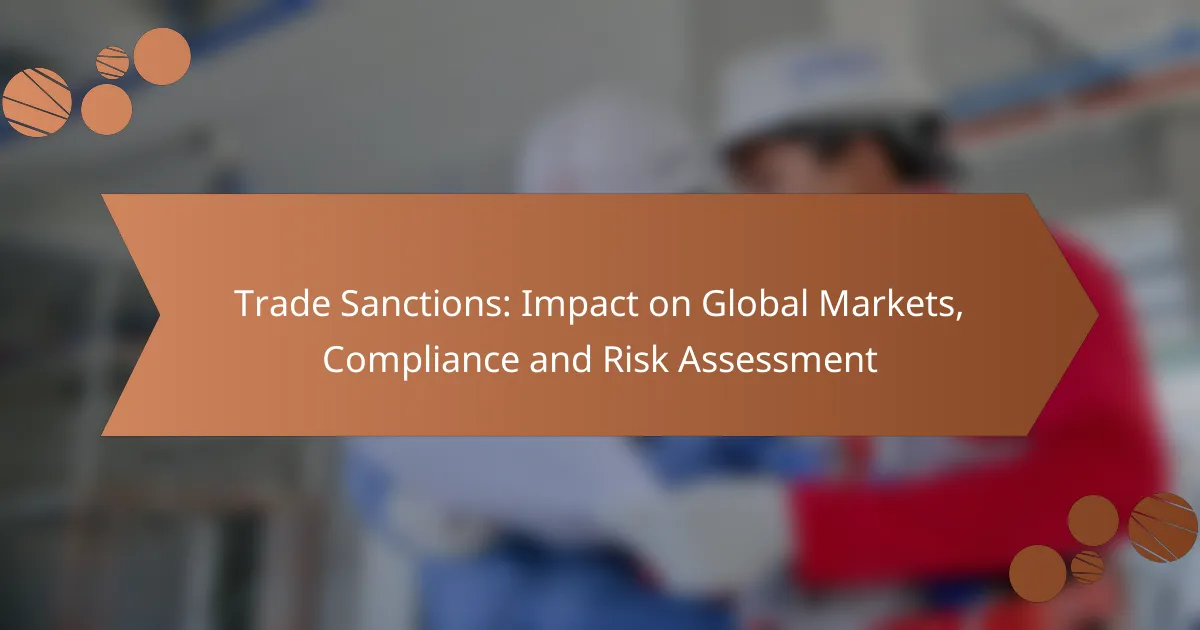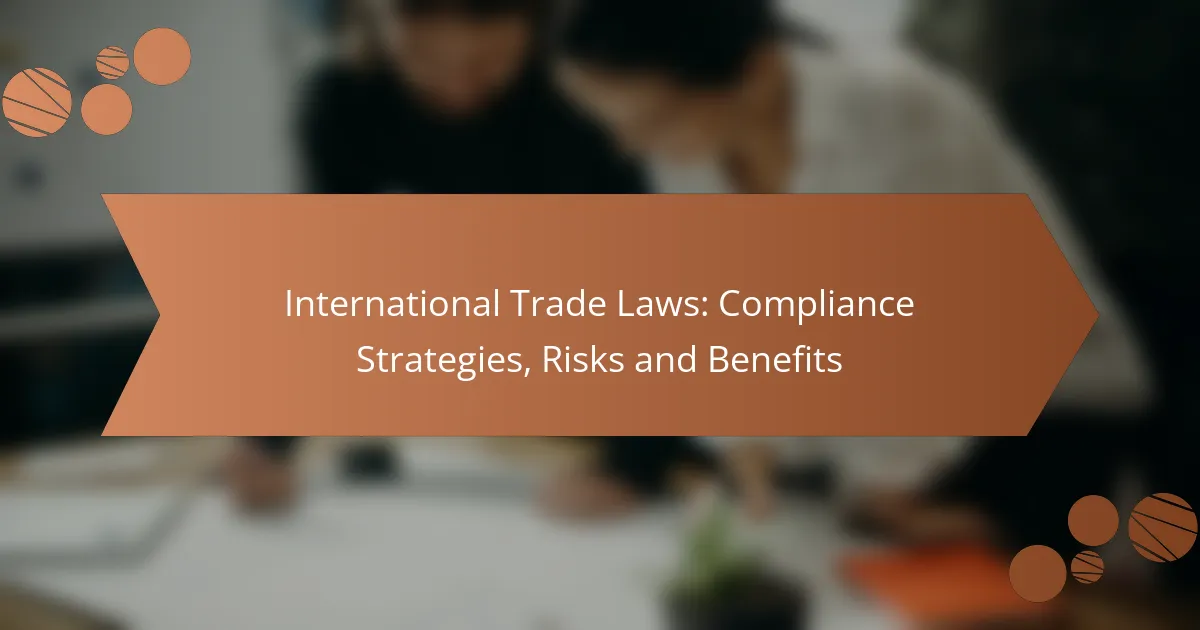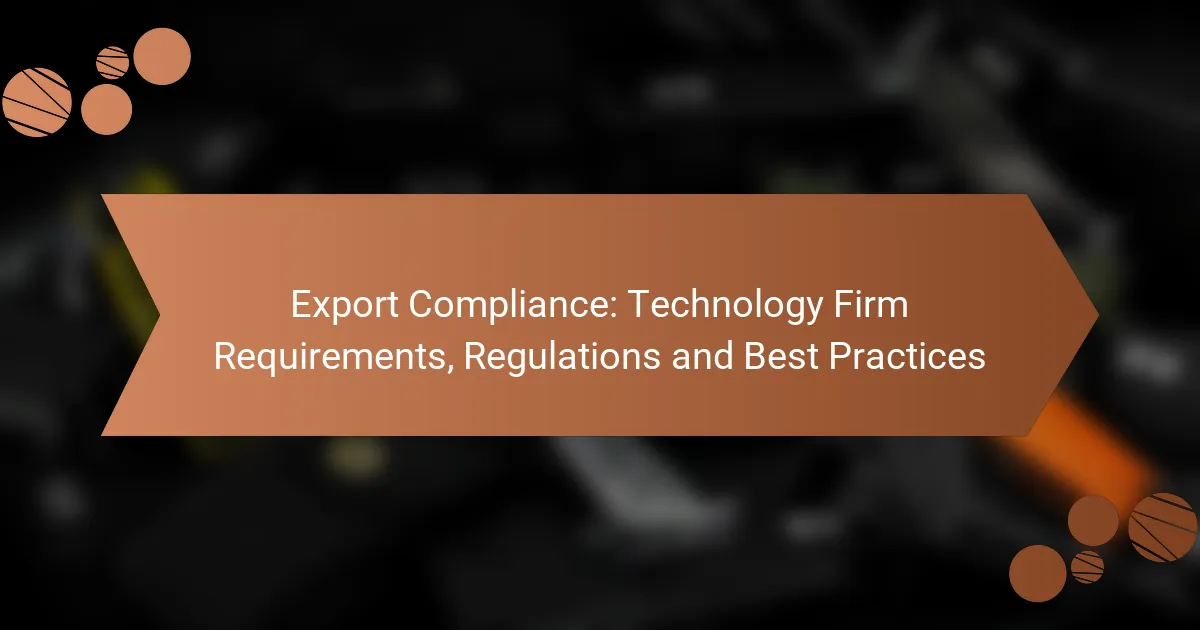Trade sanctions play a crucial role in shaping global markets by restricting trade flows and creating uncertainty for investors. As businesses navigate these complex regulations, compliance becomes essential, requiring robust risk assessment frameworks to identify potential exposures and ensure adherence to legal obligations.
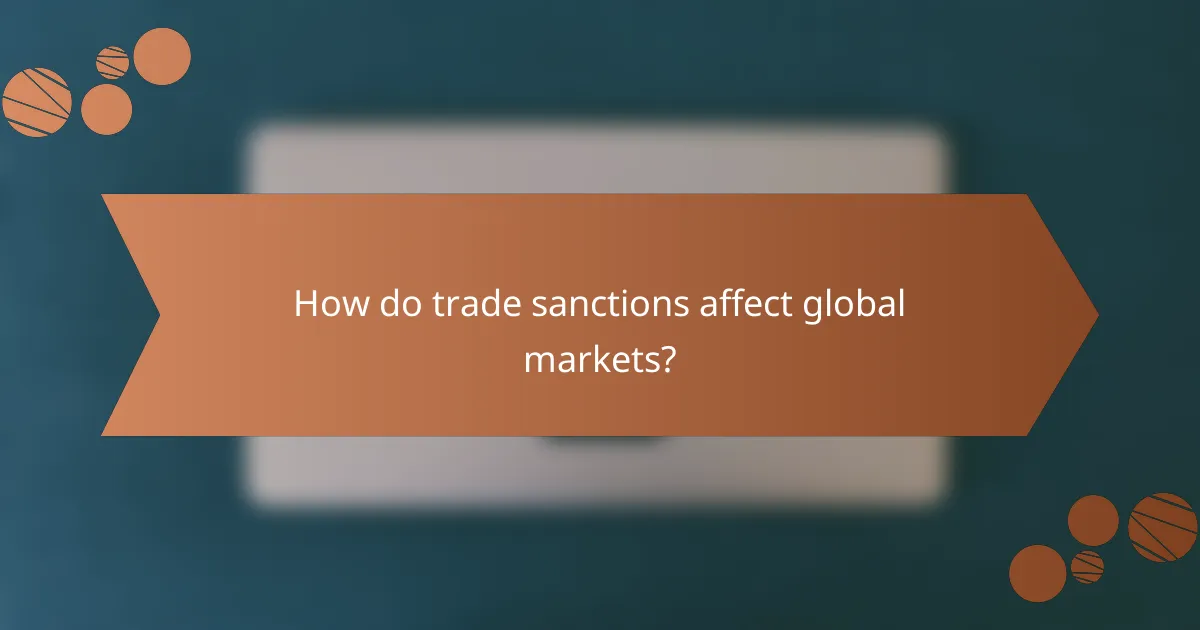
How do trade sanctions affect global markets?
Trade sanctions significantly impact global markets by restricting trade flows, altering supply chains, and increasing uncertainty among investors. These measures can lead to heightened market volatility and shifts in currency values, ultimately affecting economic stability.
Market volatility increases
Trade sanctions often lead to increased market volatility as investors react to the uncertainty surrounding affected countries. Stock prices can fluctuate dramatically in response to news about sanctions, with companies that rely on international trade particularly vulnerable. For instance, sanctions on a major oil-producing nation can cause oil prices to spike, impacting energy stocks globally.
Supply chain disruptions
Sanctions can disrupt established supply chains by limiting access to essential goods and materials. Companies may face delays or increased costs as they seek alternative suppliers or routes. For example, sanctions on a country that exports critical components can halt production for manufacturers reliant on those imports.
Currency fluctuations
Trade sanctions can lead to significant currency fluctuations, particularly for the countries directly affected. As sanctions are imposed, the value of the sanctioned country’s currency may decline due to reduced demand for its exports. Conversely, currencies of nations that trade with the sanctioned country may appreciate, reflecting changes in trade dynamics.
Investment risks
Investors face heightened risks in markets affected by trade sanctions, as the potential for financial loss increases. Companies operating in or trading with sanctioned nations may experience drops in stock prices or face legal repercussions. Investors should conduct thorough risk assessments and consider diversifying their portfolios to mitigate exposure to affected sectors.
Sector-specific impacts
Different sectors experience varying impacts from trade sanctions, with some being more resilient than others. For example, the technology sector may suffer due to restrictions on exporting software and hardware to sanctioned countries, while the agricultural sector might see increased demand for local products as imports dwindle. Understanding these sector-specific dynamics is crucial for businesses and investors alike.

What are the compliance requirements for businesses?
Businesses must adhere to various compliance requirements to navigate trade sanctions effectively. These requirements often include understanding specific regulations, implementing customer verification processes, fulfilling reporting duties, and establishing risk assessment frameworks.
Understanding OFAC regulations
The Office of Foreign Assets Control (OFAC) enforces trade sanctions in the United States, impacting businesses engaged in international transactions. Companies must familiarize themselves with the lists of sanctioned individuals and entities, as well as the specific restrictions that apply to different countries.
For compliance, businesses should regularly check the OFAC Specially Designated Nationals (SDN) list and ensure that their operations do not involve sanctioned parties. Failure to comply can lead to significant penalties, including fines and restrictions on business activities.
Know Your Customer (KYC) protocols
KYC protocols are essential for businesses to verify the identities of their customers and assess potential risks associated with them. Implementing KYC involves collecting and analyzing customer information, such as identification documents and business details.
Effective KYC practices help businesses avoid engaging with sanctioned individuals or entities. Regular updates to customer information and ongoing monitoring are crucial to maintaining compliance and mitigating risks.
Reporting obligations
Businesses must fulfill specific reporting obligations related to trade sanctions, including notifying authorities of any transactions involving sanctioned parties. This may involve submitting reports to OFAC or other relevant regulatory bodies.
Timely and accurate reporting is critical to avoid legal repercussions. Companies should establish clear procedures for identifying and reporting suspicious activities, ensuring that all employees are trained on these protocols.
Risk assessment frameworks
Establishing a robust risk assessment framework is vital for businesses to evaluate their exposure to trade sanctions. This framework should include identifying potential risks, assessing the likelihood of encountering sanctioned entities, and implementing controls to mitigate those risks.
Regular reviews and updates to the risk assessment process are necessary to adapt to changing regulations and market conditions. Companies should consider utilizing technology solutions to enhance their risk assessment capabilities and streamline compliance efforts.
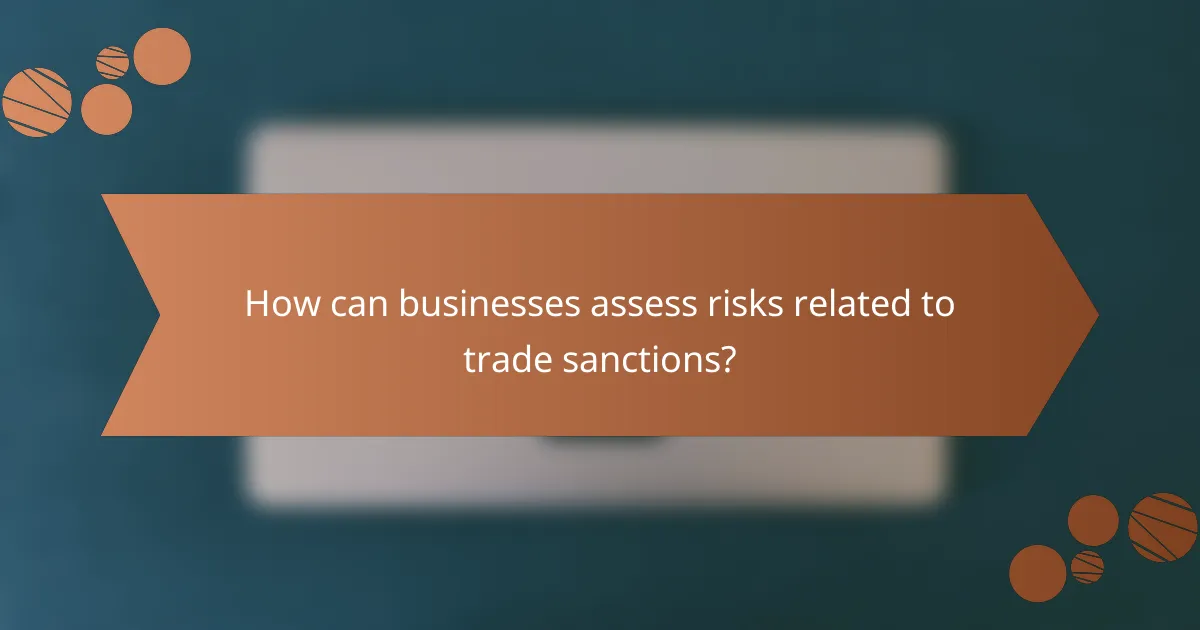
How can businesses assess risks related to trade sanctions?
Businesses can assess risks related to trade sanctions by conducting thorough evaluations of their operations, supply chains, and customer bases. This involves identifying potential exposure to sanctioned entities and understanding the implications of non-compliance.
Conducting risk assessments
Conducting risk assessments involves systematically identifying and analyzing potential risks associated with trade sanctions. Businesses should evaluate their relationships with suppliers, customers, and partners to determine if any are subject to sanctions.
Key steps include mapping out supply chains, reviewing transaction histories, and assessing the geographical locations of operations. Regularly updating these assessments is crucial as sanctions can change frequently.
Utilizing compliance software
Utilizing compliance software can streamline the process of monitoring trade sanctions and assessing risks. These tools often include features such as automated alerts for changes in sanctions lists and risk scoring for transactions.
Choosing software that integrates with existing systems can enhance efficiency. Businesses should look for solutions that offer real-time data and are regularly updated to reflect the latest regulatory changes.
Engaging legal counsel
Engaging legal counsel with expertise in trade sanctions is essential for navigating complex regulations. Legal advisors can provide insights into compliance requirements and help interpret the implications of specific sanctions on business operations.
Regular consultations can help businesses stay informed about legal developments and ensure that their risk management strategies are robust. This proactive approach can prevent costly penalties and reputational damage.
Monitoring changes in sanctions
Monitoring changes in sanctions is critical for maintaining compliance and minimizing risks. Businesses should establish a routine for checking updates from relevant authorities, such as the U.S. Department of the Treasury or the European Union.
Utilizing news alerts, subscribing to regulatory updates, and participating in industry forums can enhance awareness. Companies should also consider appointing a compliance officer to oversee these monitoring efforts and ensure timely responses to any changes.

What are the best practices for navigating trade sanctions?
To effectively navigate trade sanctions, organizations should adopt a proactive approach that includes regular training, robust compliance programs, and internal controls. These practices help mitigate risks and ensure adherence to legal requirements while maintaining operational efficiency.
Regular training for employees
Regular training is essential for employees to understand the complexities of trade sanctions and their implications. Training sessions should cover the latest regulations, potential risks, and the importance of compliance in daily operations.
Consider implementing quarterly training updates and utilizing online modules for easy access. This ensures that all employees, especially those in procurement and finance, stay informed about any changes in sanctions that could affect their roles.
Implementing robust compliance programs
A robust compliance program is critical for identifying and managing trade sanctions risks. This program should include clear policies, procedures, and designated compliance officers responsible for monitoring and enforcing compliance.
Incorporate regular audits and assessments to evaluate the effectiveness of the compliance program. This proactive approach helps identify gaps and areas for improvement, ensuring that the organization remains aligned with current regulations.
Establishing internal controls
Establishing strong internal controls is vital for preventing violations of trade sanctions. Controls should include transaction screening processes, risk assessments, and reporting mechanisms for suspicious activities.
Utilize technology solutions that automate screening against sanction lists and provide alerts for potential risks. This can significantly reduce the likelihood of inadvertent violations and enhance overall compliance efforts.
Developing contingency plans
Developing contingency plans is crucial for organizations to respond effectively to changes in trade sanctions. These plans should outline procedures for managing disruptions, including alternative suppliers and communication strategies.
Regularly review and update contingency plans to reflect current market conditions and regulatory changes. This ensures that the organization can quickly adapt to new sanctions and minimize potential impacts on operations and finances.
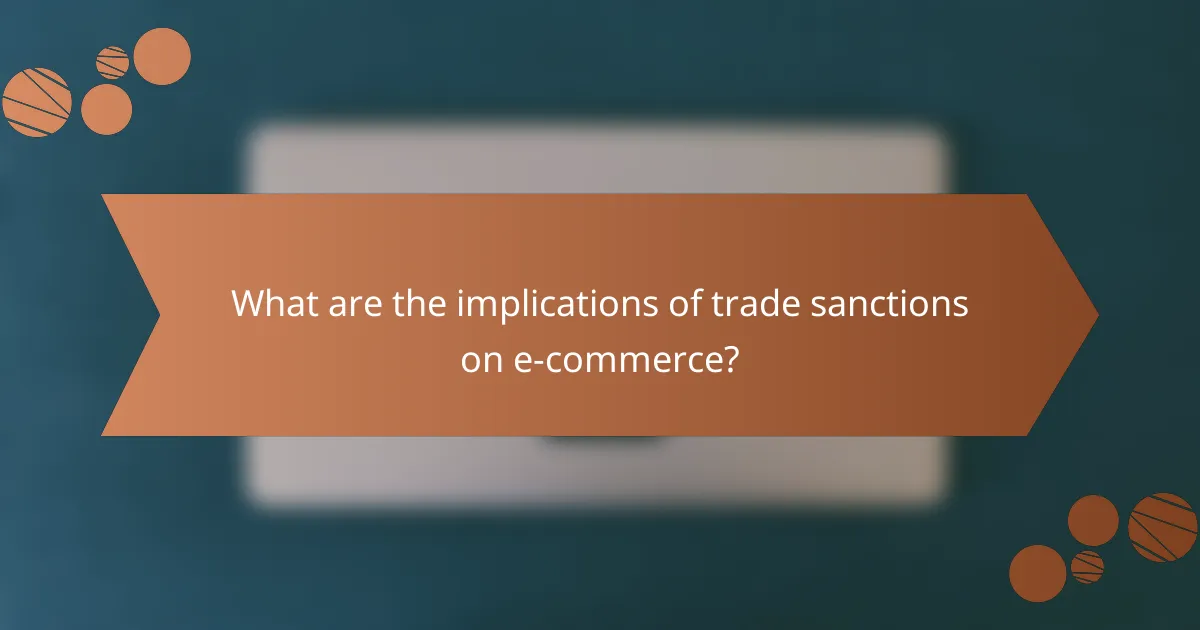
What are the implications of trade sanctions on e-commerce?
Trade sanctions significantly affect e-commerce by restricting market access and complicating compliance for online businesses. These restrictions can lead to increased costs, limited product availability, and the need for careful risk assessment to navigate international trade laws.
Impact on cross-border transactions
Cross-border transactions are heavily influenced by trade sanctions, which can restrict or completely prohibit sales to certain countries. E-commerce businesses must monitor the jurisdictions they operate in to ensure compliance with these sanctions, as violating them can result in hefty fines and legal repercussions.
For instance, a company selling electronics online may face restrictions on shipping to countries under sanctions, such as North Korea or Iran. This can limit their customer base and require adjustments in marketing strategies to focus on compliant regions.
To mitigate risks, businesses should regularly review their transaction processes and implement compliance checks. Utilizing software that tracks sanctions lists can help ensure that transactions do not inadvertently violate trade regulations.
Compliance challenges
Compliance with trade sanctions presents numerous challenges for e-commerce businesses, particularly those operating in multiple jurisdictions. Companies must stay informed about the constantly changing landscape of sanctions, which can vary significantly between countries.
For example, the U.S. Office of Foreign Assets Control (OFAC) maintains a list of sanctioned individuals and entities that businesses must check against before engaging in any transactions. Failure to comply can lead to severe penalties, including fines that can reach millions of dollars.
To enhance compliance, businesses should establish a robust compliance program that includes regular training for employees and a clear protocol for handling potential violations. This proactive approach can help mitigate risks associated with trade sanctions.
Risk assessment strategies
Effective risk assessment strategies are crucial for e-commerce businesses navigating trade sanctions. Companies should conduct thorough due diligence on their suppliers, customers, and partners to identify potential risks associated with sanctions.
One effective strategy is to categorize transactions based on risk levels, allowing businesses to prioritize compliance efforts where they are most needed. For instance, high-risk transactions may require additional scrutiny and documentation to ensure compliance with applicable laws.
Additionally, businesses should regularly review and update their risk assessment processes to adapt to new sanctions and regulations. This ongoing evaluation helps maintain compliance and reduces the likelihood of costly violations.
